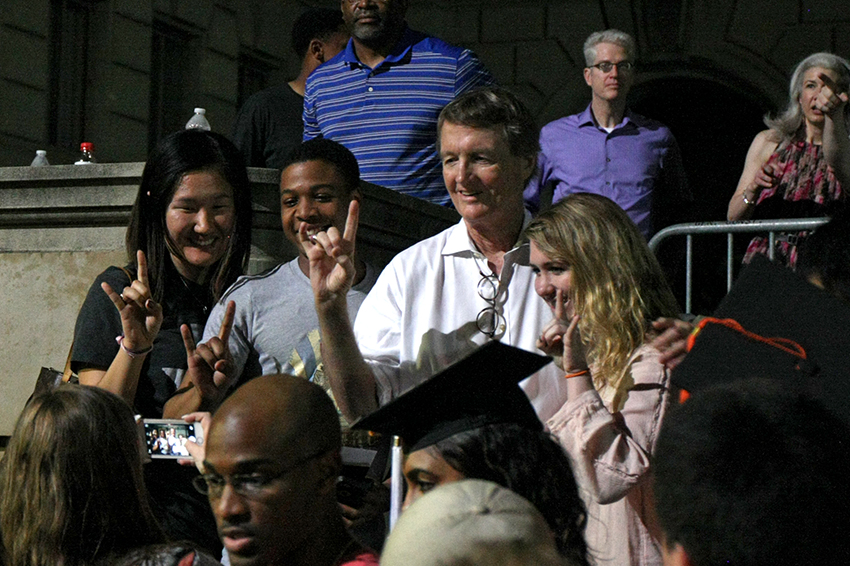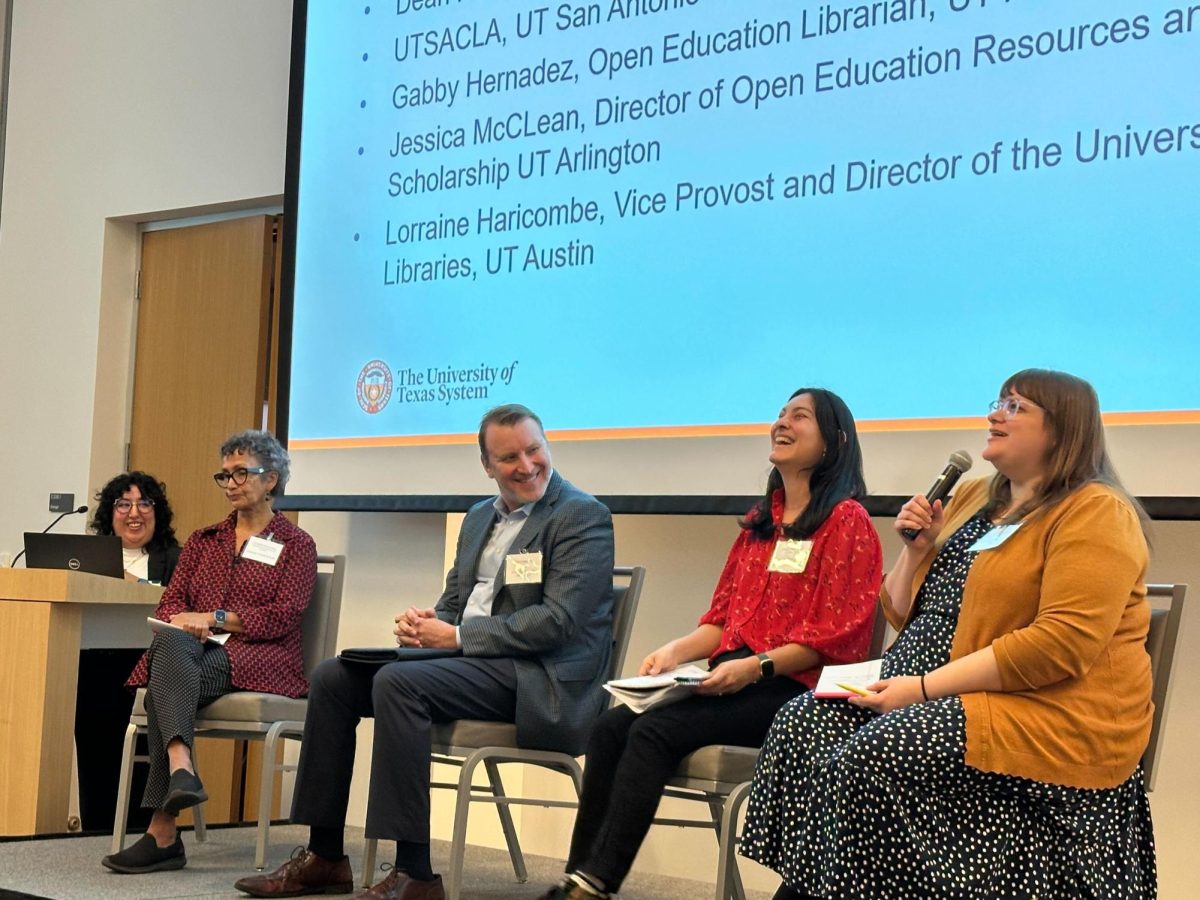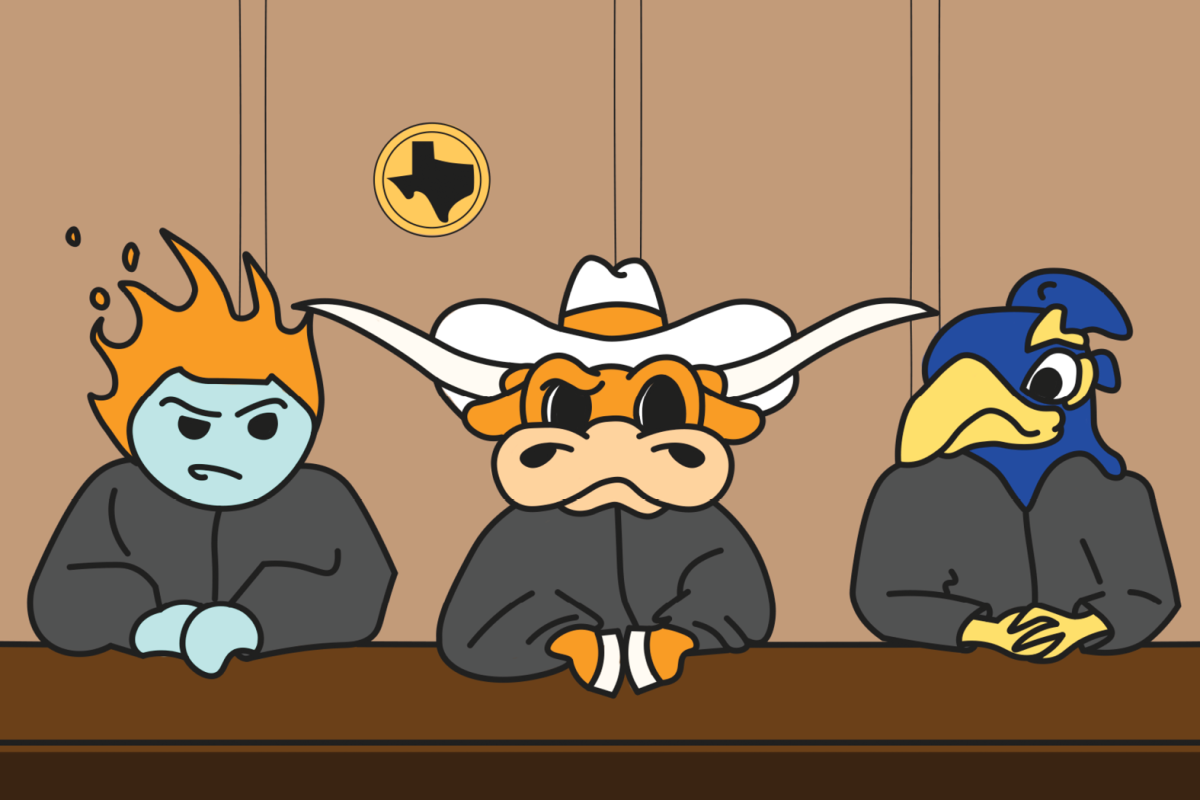Severe thunderstorms and tornado warnings caused UT to cancel its spring commencement in 2015, but students gathered the next day to host a makeshift ceremony.
Despite it being entirely unplanned, Bill Powers showed up at a moment’s notice to lead his last graduation as UT’s president for the thousands of students crowded in the rain in front of the Tower.
“That commitment to the University — I mean, it is unparalleled,” said Kori Rady, a former student body president who graduated that year. “The universe could not have perfectly aligned more for that situation. Everyone (was) super bummed, and then like it turned out to be way better than any other graduation ever.”
Powers, who served as UT’s 28th president from 2006 to 2015, has died at 72. He was the University’s second longest-serving president.
“He made Texas feel like Texas,” student body president Colton Becker said. “Powers was this heroic figure for students.”
The former UT Law dean created the School of Undergraduate Studies and Dell Medical School, and he instituted mandatory signature courses, which are now a part of every UT freshman’s education. His death was announced in an email Sunday morning from President Gregory Fenves.
“As a professor of law and freshman seminar instructor, Bill was an inspiration to four decades of students who were challenged and made better by him,” Fenves said in the email. “Bill often said his most important title at the University was Teacher. He never stopped teaching.”
Powers joined the University in 1977 as a visiting professor. He received his law degree from Harvard and attended the University of California-Berkeley, where he earned a B.A. in chemistry.
He also ran an eight-year fundraising mission called “Campaign for Texas” that brought $3.1 billion to the University. The funding helped pay for the construction of the Belo Center for New Media and Patton Hall, and established 846 new scholarships and support endowments for students.
Powers also saw the University through the Supreme Court case Fisher v. University of Texas. A rejected student, Abigail Fisher, sued the University over its race-conscious admissions practices, which UT said helped improve diversity. The lawsuit challenging the practice made it to the high court twice before being shot down in 2016, upholding UT’s affirmative action policy.
At the state level, Powers was an outspoken critic of campus carry, the law that allows individuals with permits to carry concealed handguns on college campuses. But, the legislation was signed into law by Gov. Greg Abbott the day before Powers left the University.
Powers gained national prominence when he chaired a team of investigators that looked into the collapse of the energy-trading giant Enron in 2002, while he was the law school’s dean. The team released the “Powers Report,” which detailed how Enron administrative officials generated phantom profits and hid the true size of its debt from the company’s board.
The second half of Powers’ tenure as president was defined partially by tensions between himself and the UT System Board of Regents, then-Chancellor Francisco Cigarroa and the state. Cigarroa demanded Powers’ resignation in 2014 amid the strained relationship and investigations into Powers’ admissions practices.
The student body came to his defense saying Powers needed to stay to see UT through the 2015 legislative session, just a few months away.
A group of students, faculty and alumni put together the “Students for Powers” initiative to advocate on his behalf to the UT System. The group organized hundreds of students and buses to transport them to protest in support of Powers during one of the regents’
meetings downtown.
“Nobody, truly nobody, cared more about students at the University of Texas than Bill Powers,” said UT alumnus Braydon Jones, who helped lead the initiative. “(And) it was so powerful (seeing students support him).”
Powers ultimately stayed and later stepped down shortly after the 2015 session ended. Powers joined the law faculty after resigning and taught courses on tort law and the legal process.
Rady, the last student body president to work with Powers, said the support Powers saw from the student body was the result of nearly a decade of doing everything he could to help students. Powers would often attend meetings of student groups on campus just to introduce himself and see how he could help.
One evening when Powers stopped by the Student Government Assembly meeting, Rady said he and several others – including Powers – huddled around his phone to watch the final moments of a basketball game.
2013-2014 student body president Horacio Villareal said Powers was always very approachable, often seen wearing blue jeans, boots and a short-sleeve button down UT shirt. At the end of meetings with the President’s Student Advisory Council, Villareal said Powers would kick his feet up onto his desk and start talking about one of his favorite subjects –UT sports.
“You could just tell how excited he was to talk about what was going on in Texas football or baseball or basketball or somebody that we were thinking about hiring,” Villareal said. “I could tell that was a nice way for him to just relax and be a sports fan.”
More than Powers’ accomplishments as president, or the controversies that dogged him, Rady said the defining element of his tenure was his love for students and his desire to hear from them.
“When you think about UT, you think about people like Darrell Royal,” Villareal said, referring to the late football coach. “Bill Powers etched his name on that list. He’s going to be one of the greatest UT presidents to ever serve.”




















